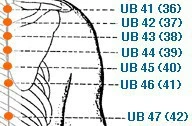Moxibustion More Effective Than Acupuncture for Chronic Fatigue (Study)
Moxibustion, the burning of the herb mugwort (ai ye) over certain acupuncture points/areas, can be extremely helpful for any number of conditions. Most commonly it is used to resolve what we would call qi and blood stagnation in the west which could be loosely related to pain from issues such as trauma, menstrual pain, post-surgical pain, etc. But there are many other uses involving improving immunity, improving the quality of blood in the body, improving organ function, among many others.
Today we are going to look at an application of moxibustion for Chronic Fatigue Syndrome (CFS). To preface this study the researchers were looking at the use of an individual acupuncture point and comparing the effectiveness of moxibustion on that point vs. acupuncture needling of that point. In clinical reality, studies like this are important to engage the minds of acupuncturists to consider their own protocols and how best to treat certain conditions. However, there is generally very little value in using a single acupuncture point to resolve these complicated syndromes (although initial symptomatic relief may happen as it did in this study). Proper treatment requires proper diagnosis in Chinese Medicine terms (see treating the cause vs. the symptoms for more on that). Our acupuncture for Chronic fatigue section has some of the more common diagnoses and approaches.
In this study, researchers recruited 72 patients and divided them into an acupuncture treatment group and a moxibustion treatment group. The patients were given a course of treatment daily for 4 days, a 2 day break and then another 4 days of treatment and continued that course for 3 courses total.
The points utilized in both the acupuncture and the moxibustion group were as follows:
In the moxibustion treatment group the practitioners utilized cone moxa (chinetsukyu in Japanese). Each treatment used 10 cones of moxa at UB 43 and 7 cones at CV 6 and ST 36.
Using the fatigue assessment index (FAI) before and after treatment, the researchers observed a total effective rate of 88.9% in the moxibustion group. The acupuncture group had a 72.2% effective rate. The researchers concluded that "moxa at UB 43 can improve the FAI score of patients with Chronic Fatigue Syndrome".
What this study indicates is that some, possibly many, cases of chronic fatigue syndrome will benefit from the warming, tonifying and moving aspects of moxibustion. But clinically, not all underlying causes would respond and some could potentially be worsened by moxibustion, particularly excessive amounts. All things considered, however, this syndrome is well treated with Chinese Medicine when properly applied.
Here are a few other relevant studies involving Chinese Medicine approaches:
- Acupuncture back shu points found effective for chronic fatigue syndrome
- Qigong found helpful with Chronic Fatigue
- Tuina (medical massage) found helpful with Chronic Fatigue
For the most part true healing of these and most other conditions will involve the proper application of the full breadth of Chinese Medicine (acupuncture, herbal medicine, tuina, qigong, etc.) and proper dietary and lifestyle change on the part of the patient.
tag @yinyanghouse for questions/comments
